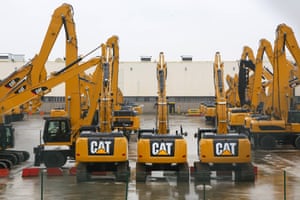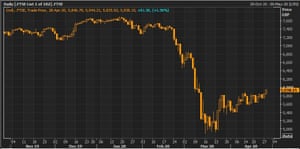Earlier today, UK’s financial watchdog fired a warning shot at Britain’s banks not to pressure corporate clients to give them work in return for financial assistance in the crisis.
The FCA suspects that some banks have been demanding to take part in lucrative jobs such as share sales, in return for agreeing to emergency loans. Pretty unprofessional if so!
European markets close higher
Europe’s investors have shaken off the latest weak economic data, pushing shares higher across the region.
Trading has just ended, with Britain’s FTSE 100 up 111 points of 1.9% at 5958, a seven-week high.
John Kicklighter
(@JohnKicklighter)The FTSE 100 ($UKX) made its break today. That is the ‘easy’ part in the technical sense. The more significant struggle is finding follow through pic.twitter.com/qqbFEiFXiM
Lloyds Bank was the top performer today, gaining almost 9% (up to the giddy heights of 33p), followed by JD Sports (up 8.5%). Cruise operator Carnival gained 8%.
The Europe-wide Stoxx 600 index closed 1.5% higher, with all the major indices up.
France’s CAC gained 1.3%, as prime minister Edouard Philippe outlined plans to ease its lockdown from May 11.
Schools will gradually reopen and businesses will be free to resume operations, Philippe told parliament. However, restaurants and cafes will remain closed until at least early June and professional sports, including soccer, will not begin again until the autumn.
Interestingly…. the rally on Wall Street is somewhat fizzling out.
The Dow is now down 0.25%, while the tech-heavy Nasdaq index has dropped by 1%.
Perhaps investors are fretting that today’s slump in consumer confidence doesn’t bode terribly well for the economy this year.
Especially as stocks have already rebounded strongly in recent weeks….
jeroen blokland
(@jsblokland)With the S&P 500 Index now up more than 30% from its low, the question arises if this is a bear market rally or a bull market correction. pic.twitter.com/bzd183V4I9
Here’s a neat chart showing the recent divergence between the US stock market and consumer confidence.
Bill Kennedy
(@risk_report)Stocks and Consumer Confidence.
I’m sure it’s nothing. pic.twitter.com/rL4zm3g0Tf
We’ll find out in a month’s time whether they’ve converged again – either through a drop in stocks or a rise in confidence…. (or maybe both!)
US economist David Rosenberg feels the plunge in US consumer confidence is rather at odds with the recent stock market rally.
David Rosenberg
(@EconguyRosie)The Conference Board confidence report showed that just 34% of consumers, that 70% chunk of GDP, believes that business conditions are “normal”. That jives with an 18-year high 20x forward P/E multiple how, exactly? pic.twitter.com/9Hzgj2STb1
Economist Rupert Seggins feels Americans aren’t nearly anxious enough!
Rupert Seggins
(@Rupert_Seggins)Given that tens of millions of people in the US have filed for unemployment benefits in April, I am amazed that the fall in consumer confidence is so small. https://t.co/RgIrRzQILT
There is one glimmer of hope in the US consumer confidence report — Americans are a little less pessimistic than a month ago.
The ‘future expectations’ index, which asks people how they feel about the next six months, actually improved to 93.8 from 86.8 in March.
That suggests that the US public may be looking forward to lockdown rules being lifted soon.
But it was more than cancelled out by the record slump in how people feel about the economy right now (the current conditions index, which plunged to 76.4 from 166.7).
Tonya Garcia
(@tgarcianyc)Consumer confidence suffers record drop in April, but Americans more hopeful of future: https://t.co/O5mgy6oxk4 pic.twitter.com/dbbJuD6gPu
Stock markets have actually pushed higher since the US consumer confidence figures were released.
The UK’s FTSE 100 index is now up 124 points or 2% at 5969 points, on track to close at its highest level in seven weeks.
Roughly one in six Americans expect their income to decline over the next six months, today’s consumer confidence report shows.
Christopher Nicolas Dembik
(@Dembik_Chris)Without much surprise, big drop in US consumer confidence. The conference board index is out at 86.9 in April vs 87.9 expected and prior 120. The share of consumers expecting income to decrease over the next six months jumped to 18.5% vs prior 10.1%. pic.twitter.com/ptwV8N2QkL
US consumer confidence plunges
Oof! US consumer confidence has plunged to its lowest level in nearly six years, as the Covid-19 pandemic spooks Americans.
The Conference Board’s Consumer Confidence Index has slumped to 86.9 for April, the lowest since June 2014. That’s down from 120 points in March — a truly dramatic (but not unsurprising) slide.
Bespoke
(@bespokeinvest)Another worst ever. Largest two-month decline in Consumer Confidence on record (since 1967). pic.twitter.com/7B0DS6fLCj
The Conference Board’s assessment of the current economic situation fell especially sharply – in response to the surge in jobless claims across America, and the widespread lockdowns of factories and offices.
Marc Ostwald
(@MOstwald1)#US #Consumer #Confidence Present Situation …. watch out below!!! April 75.4 vs. March 166.7 pic.twitter.com/QQBaewIU4F
Updated
Wall Street has hit a near seven-week high at the start of trading, matching the move in London today.
The Dow Jones industrial average has risen by 314 points, or 1.3%, to 24,448, its highest level since Wednesday 11th March (during the worst week of the 2020 crash).
Investors seem to be increasingly optimistic that the lockdowns which have caused such economic pain in recent weeks will ease soon, with the massive central bank money-printing operations likely to support asset prices too.
Bloomberg Markets
(@markets)U.S. markets open higher https://t.co/SHmYx47Ki7 pic.twitter.com/HMZaPwRzVS
America’s trade deficit has widened, partly due to a collapse in sales of new cars and industrial equipment to overseas customers.
The Commerce Department has reported that the gap between the goods bought and sold by the US expanded by 7.2% last month to $64.2bn. Although Americans did buy less from abroad, that was more than countered by a drop in exports.
Reuters has the details:
In March, goods imports dropped 2.4% to $191.9 billion after decreasing 2.5% in February.
There were sharp decreases in imports of consumer goods and motor vehicles and parts. Imports of food, industrial supplies and capital goods rose last month.
Exports of goods tumbled 6.7% to $127.6 billion in March. There was a broad decline in exports last month, with shipments of industrial supplies dropping 7.5% and motor vehicles and parts plummeting 17.8%.
The volume of cargo being transported around the world by air tumbled by 15% in March, according to the International Air Transport Association (IATA), less than during the global financial crisis in 2008 when volumes fell by 23%.
Airlines suffering a 30% decline in passenger travel are quickly trying to repurpose passenger aircraft, or bring freight airplanes out of storage in order to fly goods including medical supplies and pharmaceuticals around the world, according to the industry body.
However IATA expects the volume of cargo flown around the world to fall during 2020 as the expected recession reduces consumers’ demand for goods.

Caterpillar excavators at its plant in Gosselies, Belgium. Photograph: Julien Warnand/EPA
Sales at mining and construction equipment maker Caterpillar have been hit hard by the Covid-19 pandemic.
Caterpillar has reported that sales slumped by 21% in the first three months of 2020, as the global economy seized up.
Revenues fell to $10.6bn, down from $13.5bn, due to “lower end user demand”
Profit fell sharply too, from $2.94 per share a year ago to $1.60 per share — below forecasts of $1.69.
Caterpillar is not providing any full-year 2020 guidance due to uncertainties surrounding the pandemic.
The recent recovery in stock markets came after central banks and governments launched huge new rescue packages to help businesses and individuals survive the lockdown.
This video explainer runs through the various schemes, and explains the risks….
How big money measures are helping the economy through coronavirus – video explainer
More gloom: The U.K. economy isn’t expected to return to its pre-coronavirus peak until the end of next year.
The National Institute for Economic and Social Research has predicted that the UK economy will shrink by 30% during the lockdown, and not return to the levels of Q4 2019 until the last quarter of 2021.
FTSE 100 hits near seven-week high
Despite all the bad news this morning, Britain’s stock market has just hit its highest level in nearly seven weeks.
The FTSE 100 index of blue-chip shares is rallying hard, up 94 points or 1.6% at 5941 points.
That’s its highest level since Wednesday March 11 (the day before the index suffered its worst day since 1987).

The FTSE 100 this year Photograph: Refinitiv
Retail group JD Sports is the top riser, up 8%, followed by Barclays (+7%) and exhibitions group Informa (+7%).
European markets are higher too, with the Stoxx 600 now up 1.5% today. Italy’s FTSE MIB has gained 2.5%.
Investors appear to be wagering that Covid-19 lockdown measures will ease soon, and that companies will recover from this year’s trauma.
Chris Beauchamp, chief market analyst at IG, explains:
“Further gains for the FTSE 100 look odd on a morning when major components like BP and HSBC report poor earnings, but for the most part the gainers in the index are those that will see an upturn in activity as lockdowns ease across most of the globe, if perhaps not yet in the UK.
This continues the theme from yesterday’s session, when it seemed as if the whole world was looking to a post-coronavirus environment, when some semblance of normality may return.”







